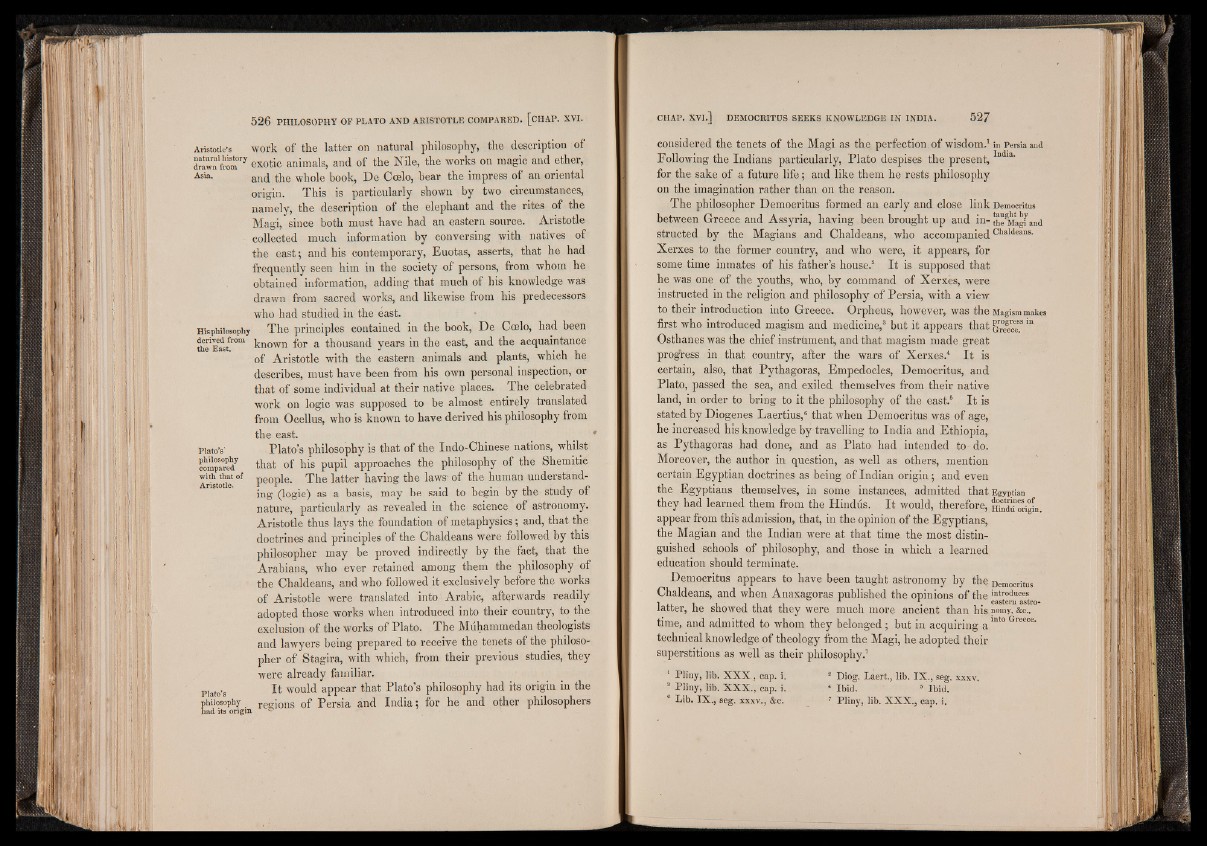
Aristotie-s work of the latter on natural philosophy, the description of
drawn from°ry exotic animals, and of the Nile, the works on magic and ether,
Asia- and the whole book, De Ccelo, bear the impress of an oriental
origin. This is particularly shown by two circumstances,
namely, the description of the elephant and the rites of the
Magi, since both must have had an eastern source. Aristotle
- collected much information by conversing with natives of
the east ; and his contemporary, Euotas, asserts, that he had
frequently seen him in the society of persons, from whom he
obtained information, adding that much of his knowledge was
drawn from sacred works, and likewise from his predecessors
who had studied in the east.
His philosophy The principles contained in the book, De Ccelo, had been
derived from known for a thousand years in the east,tue ihost. * t and the acqual i'nitaln»ce
of Aristotle with the eastern animals and plants, which he
describes, must have been from his own personal inspection, or
that of some individual at their native places. The celebrated
work on logic was supposed to be almost entirely translated
from Ocellus, who is known to have derived his philosophy from
the east.
Plato’s' Plato’s philosophy is that of the Indo-Chinese nations, whilst
compared^ that of his pupil approaches the philosophy of the Shemitic
with that of -people. The latter having the laws- of the human understand-
Aristotle, r r ^ • -i i • i i j i? ing (logic) as a basis, may be said to begin by the- study ot
nature, particularly as revealed in the science of astronomy.
Aristotle thus lays the foundation of metaphysics ; and, that the
doctrines and principles of the Chaldeans were followed by this
philosopher may be proved indirectly by the fact, that the
Arabians, who ever retained a/nong them the philosophy of
the Chaldeans, and who followed it exclusively before the works
of Aristotle were translated into Arabic, afterwards readily
adopted those works when introduced into their country, to the
exclusion of the works of Plato. The Múhammedan theologists
and lawyers being prepared to receive the tenets of the philosopher
of Stagira, with which, from their previous studies, they
were already familiar.
PIat0.s It would appear that Plato’s philosophy had its origin in the
hpahdil oistso pohryig in re®gions of Persia and India; for he and other philosophers
considered the tenets of the Magi as the perfection, of wisdom.1 in Persia and
Following the Indians particularly, Plato despises the present, India‘
for the sake of a future life; and like them he rests philosophy
on the imagination rather than on the reason.
The philosopher Democritus formed an early and close link Democritus
between Greece and Assyria, having been brought up and in- theSMagf and
structed by the Magians and Chaldeans, who accompaniedChaIdeans-
Xerxes to the former country, and who were, it appears, for
some time inmates of his father’s house.2 It is supposed that
he was one of the youths, who, by command of Xerxes, were
instructed in the religion and philosophy of Persia, with a view
to their introduction into Greece. Orpheus, however, was the Magism makes
first who introduced magism and medicine,3 but it appears that GreeceT m
Osthanes was the chief instrtiment, and that magism made great
progress in that country, after the wars of Xerxes.4 It is
certain, also, that Pythagoras, Empedocles, Democritus, and
Plato, passed the sea, and exiled themselves from their native
land, in order to bring to it the philosophy of the east.5 It is
stated by Diogenes Laertius,6 that when Democritus was of age,
he increased his knowledge by travelling to India and Ethiopia,
as Pythagoras had done, and as Plato had intended to-do.
Moreover, the author in question, as well as others, mention
certain Egyptian doctrines as being of Indian origin; and even
the Egyptians themselves, in some instances, admitted that Egyptian
they had learned them from the Hindus. It would, therefore, Hindk origin,
appear from this admission, that, in the opinion of the Egyptians,
the Magian and the Indian were at that time the most distinguished
schools of philosophy, and those in which a learned
education should terminate.
Democritus appears to have been taught astronomy by the Dem0critus
Chaldeans, and when Anaxagoras published the opinions of the introduces
1 ,, 1 1 1 1 1 i • eastern astro- latter, he showed that they were much more ancient than his pomy, &c.,
time, and admitted to whom they belonged; but in acquiring a mt° Greece-
technical knowledge of theology from the Magi, he adopted their
superstitions as well as their philosophy.7
1 PUny> hb. X X X ., cap. i. 2 Diog. Laert., lib. IX ., seg. xxxv.
* Pliny, lib. X X X ., cap. i. 4 Ibid. 5 Ibid.
’ Lib. IX ., seg. xxxv., &c. 7 Pliny, lib. X X X ., cap. i.